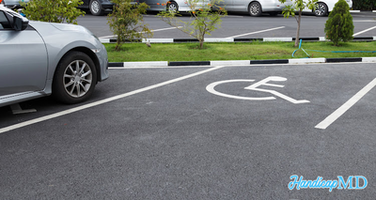
Myths vs. Facts: Debunking Common Misconceptions about Handicap Placards in Colorado
For individuals with disabilities, disability parking tags, also known as placards or permits, are critical tools that help make day-to-day mobility easier by providing access to designated accessible parking spaces. These spaces are typically located near the entrances of public facilities, shopping centers, medical offices, and other commonly visited locations, making it easier for people with disabilities to navigate parking lots and access buildings safely.
Despite their widespread use and importance, many myths and misconceptions surround the rules and regulations for using disability tags, particularly in states like CO, where the law takes accessibility seriously. Misunderstanding these rules can lead to misuse of disability tags, unintended violations, and frustration for both individuals with disabilities and the general public.
This article aims to address some of the most common myths about handicap placards in Colorado and provide factual information to clear up any confusion. We’ll also explore the correct usage of disability tags, how to avoid penalties, and include FAQs to answer common questions.
Introduction to Handicap Placards in Colorado
What Are Disability Tags?
A disability parking tag is a permit issued to individuals with disabilities that allow them to park in designated accessible handicap parking spaces. These tags, often hung from the rearview mirror or in the form of a disability license plate, ensure that people with disabilities have convenient access to buildings and facilities. In CO, the Colorado DMV oversees the issuance and regulation of disability tags.
Before diving into myths and facts, it’s helpful to understand what a disability tag is and who qualifies for one in CO. The state's Division of Motor Vehicles (DMV) issues two main types of handicap permits:
- Permanent Tags or Plates: For individuals with long-term or lifelong disabilities.
- Temporary Tags: Issued for short-term disabilities that may require limited accessibility for a few months. Typically valid for up to 90 days, these tags can be renewed once if necessary.
To qualify for a disability tag, applicants must have a verified physical impairment, such as limited mobility, respiratory issues, or a condition that severely impacts walking distance without assistance. A medical professional must verify the condition and submit the certification along with the application to the DMV.
Application Process for Disability Tags in Colorado
The application process for a Colorado handicap placard involves a few straightforward steps:
- Obtain the Application Form: Available at any state Division of Motor Vehicles (DMV) office or through their website.
- Complete the Form with Medical Certification: A licensed HandicapMD healthcare provider must complete the medical portion of the form to confirm the applicant’s eligibility based on Colorado’s qualifying conditions.
- Submit the Application: Once completed, the application can be mailed or submitted in person at any DMV location. Temporary tags typically involve a small fee, while permanent tags are issued free of charge.
- Renew as Needed: Renewal requirements depend on the type of tag, with permanent tags needing renewal every three years.
How to Obtain a Permit Online with HandicapMD.com
HandicapMD.com offers a convenient telehealth service that simplifies the process of getting your disabled parking permit by allowing you to:
- Sign Up: Visit the HandicapMD.com website and fill out the necessary form to schedule a consultation.
- Consultation: A certified doctor will assess your medical records and determine whether you meet the eligibility criteria.
- Medical Certification: The doctor will complete the certification section of the Virginia DMV's Disabled Parking Placard Application (Form MED 10).
- Submit Your Application: Once your form is completed, submit it to the state's DMV either in person or by mail.
Why Proper Use Is Important
Proper use of a disability tag ensures that accessible parking spaces remain available for those who truly need them. Misuse or misunderstanding of the rules can lead to inconvenience, frustration, and legal consequences. Misusing these permits can also reduce the number of available spaces for people who genuinely require them.
Myth vs. Fact: Debunking Handicap Placard Misconceptions in Colorado
Misunderstandings about handicap placards can lead to misuse, frustration, and misunderstandings among the general public. Here’s a closer look at some common myths, contrasted with the facts.
Myth 1: Disability Tags Are Only for People Who Use Wheelchairs
Fact: Disability Tags Cover a Range of Conditions
One of the most persistent myths is that disability tags are reserved exclusively for individuals who use wheelchairs or mobility scooters. While these individuals certainly qualify, the reality is that a wide range of conditions can make someone eligible for a disability tag.
In CO, a disability tag is issued to individuals who:
- Cannot walk 200 feet without stopping to rest.
- Require the use of assistive devices like canes, crutches, or walkers.
- Have severe lung disease or breathing difficulties.
- Use portable oxygen.
- Have a cardiac condition classified as Class III or IV by the New York Heart Association.
- Have a severe limb impairment or a condition that affects mobility.
These conditions highlight the fact that a person does not need to use a wheelchair to qualify for a disability tag. Many people have invisible disabilities that severely limit their ability to walk, making them eligible for a tag.
Myth 2: Any Family Member Can Use a Disability Tag
Fact: Disability Tags Are Issued to Individuals, Not Vehicles
Another common misconception is that once a disability tag is issued, anyone who drives or rides in the vehicle can use it to park in accessible parking spaces. This is false. In CO, disability tags are issued to specific individuals, not vehicles. This means that the tag can only be used when the person with the disability is in the vehicle, either as the driver or a passenger.
Using the tag when the individual with the disability is not present is considered misuse and can result in penalties, including fines or even the revocation of the disability tag.
If someone uses your disability tag without you being present, they are violating the law, even if they have the best intentions. The tag is meant to assist the person with the disability, not to provide convenient parking for friends or family members.
Myth 3: If You Have a Disability Tag, You Can Park Anywhere
Fact: Disability Tags Are for Designated Accessible Parking Spaces
Some people believe that having a disability tag allows them to park in any space, including restricted areas like fire lanes, loading zones, or areas marked "No Parking." This is completely false. A disability tag only allows the holder to park in designated accessible parking spaces, which are marked with the blue wheelchair symbol.
Parking in non-accessible spaces, even with a disability tag, is illegal. If you park in a fire lane, bus stop, or other prohibited zones, you may receive a ticket, regardless of whether you have a disability tag.
In addition to accessible spaces, it’s important to follow any time limits or additional parking restrictions that may apply to certain areas.
Myth 4: Once Issued, a Disability Tag Never Expires
Fact: Disability Tags Must Be Renewed Regularly
Many people mistakenly believe that once they receive a disability tag, it lasts indefinitely. However, in CO, disability tags have an expiration date and must be renewed to remain valid.
- Permanent disability tags are typically valid for three years, after which they must be renewed.
- Temporary disability tags are issued for a shorter period, usually up to 90 days, and can be renewed if necessary with a new medical certification.
It’s important to keep track of the expiration date on your disability tag and apply for a renewal before it expires. Using an expired disability tag can result in fines or parking violations, even if you still qualify for the tag.
Myth 5: There Are No Consequences for Misusing a Disability Tag
Fact: Misuse Can Lead to Fines, Penalties, and Revocation of Privileges
Misusing a disability tag, whether intentional or not, can lead to serious consequences in CO. Some common examples of misuse include:
- Using the tag when the person with the disability is not in the vehicle.
- Parking in non-designated spaces, such as fire lanes or restricted areas.
- Using an expired or invalid tag.
- Altering or duplicating a disability tag.
If you’re caught misusing a disability tag, you could face penalties such as fines, revocation of the tag, or even criminal charges for fraud in severe cases. The state law takes the misuse of disability tags seriously to ensure that accessible spaces remain available for individuals who genuinely need them.
Myth 6: Temporary Disabilities Don't Qualify for a Disability Tag
Fact: Temporary Tags Are Available for Short-Term Conditions
Some people mistakenly believe that only individuals with permanent disabilities can qualify for a disability tag. In reality, CO offers temporary disability tags for people who have short-term conditions that limit their mobility, such as recovering from surgery, a broken leg, or another injury.
Temporary disability tags are usually issued for up to 90 days, but they can be renewed if the individual’s condition requires an extended recovery period. Like permanent disability tags, temporary tags allow the user to park in designated accessible spaces but are intended for individuals who will recover from their condition over time.
Myth 7: Disability Tags from Other States Aren't Valid in Colorado
Fact: Disability Tags Are Recognized Across State Lines
Under the Americans with Disabilities Act (ADA), disability tags are recognized across all U.S. states. This means that if you have a valid disability tag from another state, you can use it in CO to park in designated accessible spaces.
Similarly, if you have a CO disability tag, it is valid in other states. However, it’s important to familiarize yourself with local parking regulations and time limits, as these may vary by city or state. Some states may also have specific rules about parking fees for individuals with disability tags.
Myth 8: Disability tag holders can park anywhere for free
Fact: Disability tags allow parking in designated accessible spots but do not permit free parking in all locations.
In CO, disability tags enable holders to park in accessible parking spaces but do not give them permission to park in all locations. Fees may still apply in certain places, such as metered parking spaces or private parking lots. Each city in CO may have specific rules regarding metered parking, so it’s wise to check local regulations if unsure.
Myth 9: A disability tag belongs to the car, not the person
Fact: A disability tag is issued to an individual, not a specific vehicle.
Disability tags are associated with the person who has the disability, not their vehicle. This means the tag can be used in any vehicle that is actively transporting the person with the disability. Misusing the tag by letting others use it or by leaving it in a vehicle when the disabled individual is not present is illegal and can result in fines and penalties.
Myth 10: People with disability tags don’t need to renew them
Fact: Disability tags, both permanent and temporary, require periodic renewal.
Even “permanent” disability tags have renewal requirements to ensure accurate records and prevent misuse. In CO, permanent tags need renewal every three years, while temporary tags are usually issued for 90 days, with a possibility for one-time renewal. Renewal requires an updated application, but permanent tags do not always require a new medical certification.
Myth 11: You can get a disability tag without a doctor’s note
Fact: A licensed medical professional’s certification is mandatory for disability tag approval.
In CO, obtaining a disability tag requires verification from a licensed healthcare provider, which must be included in the application process. This certification confirms that the applicant meets the state’s specific requirements for a disability tag, and it ensures that the system supports individuals with legitimate needs.
Myth 12: Disability tags are only for older adults
Fact: Disability tags are available to people of all ages who meet the eligibility criteria.
While older adults are more likely to need disability tags due to age-related health issues, individuals of any age can apply if they have a qualifying medical condition. Young adults and children with chronic illnesses or mobility impairments are also eligible, provided they have a certified medical need.
Frequently Asked Questions (FAQs)
1. Can I use my CO disability tag in other states?
Yes, CO disability tags are valid in all U.S. states under the Americans with Disabilities Act (ADA). You can use your tag to park in designated accessible parking spaces while traveling. However, always check local regulations regarding time limits and parking fees, as these may vary by location.
2. How do I apply for a disability tag in CO?
To apply for a disability tag in CO, you must complete the DR 2219 Form (Application for Persons with Disabilities Parking Privileges). You’ll also need medical certification from a licensed healthcare provider. Submit the completed form to your local Colorado DMV. There is no fee for a permanent tag, but there may be a small fee for a temporary tag.
3. What should I do if my disability tag is lost or stolen?
If your disability tag is lost or stolen, you should apply for a replacement by submitting a new DR 2219 form to the state DMV. You may be asked to provide a signed affidavit explaining the circumstances of the loss. If the tag was stolen, it’s a good idea to report the theft to local law enforcement.
4. Can I get a ticket if my tag is improperly displayed?
Yes, failure to display your disability tag properly can result in a parking ticket. Your tag must be hung from the rearview mirror with the front side (displaying the permit number and expiration date) visible through the windshield. If your tag is not clearly visible or if it’s obstructed, you could be fined.
5. Are there disability license plates in CO?
Yes, CO offers disability license plates in addition to tags. These plates are affixed to your vehicle and allow you to park in accessible spaces without needing to display a separate tag. Disability license plates are typically issued to individuals with permanent disabilities who own or lease a vehicle.
6. Do I need a new doctor’s note for renewal?
Generally, permanent tag holders do not need a new certification for renewal, but requirements may vary based on individual circumstances.
7. Can I apply online for a disability tag in CO?
While forms can be accessed online, the completed application must be submitted in person or by mail to the DMV.
Conclusion
There are many misconceptions about the use of handicap placards in Colorado, but understanding the facts is essential for using your tag properly and legally. Disability tags offer critical parking accommodations for individuals with mobility challenges, but they must be used responsibly to ensure that accessible spaces remain available for those who need them most.
By debunking common myths and understanding the rules, you can make the most of your disability tag while avoiding potential fines and penalties. Always ensure your tag is properly displayed, use it only when necessary, and renew it before it expires. If you follow these guidelines, you can enjoy the benefits of accessible parking in Colorado and beyond.
.png)






